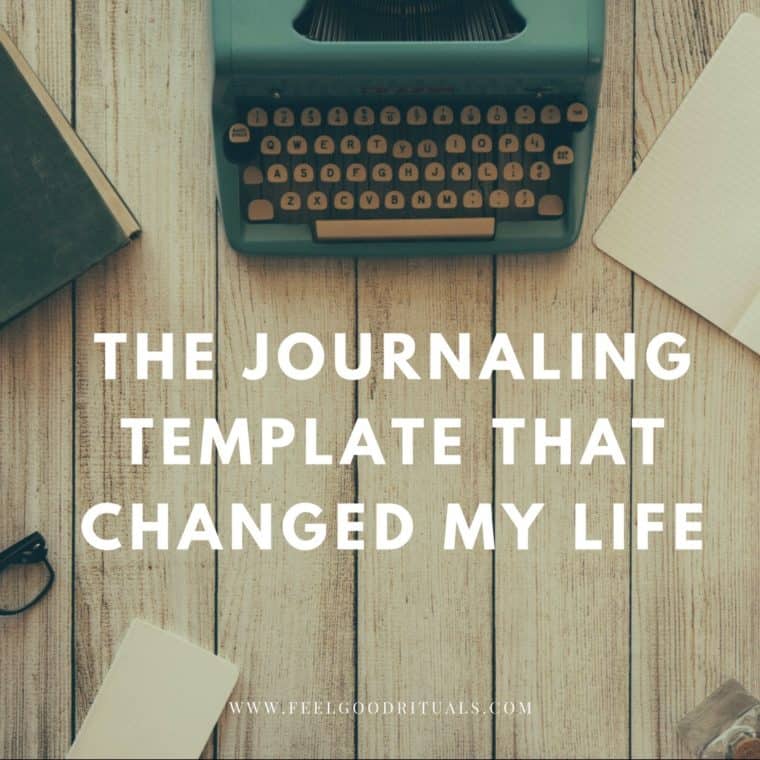I started journaling five years ago. It became almost a ritual in its own right, because it changed my life in so many positive ways.
In my previous article I outlined numerous benefits of keeping a journal. This post is about a specific process and writing prompts that I use to lead my thoughts and keep things tidy and structured.
My Journaling Process
- Every Sunday afternoon, I set approximately half an hour to an hour aside to write a journal.
- In contrast to many other people, I only do my journaling on a weekly basis—I don’t have the time to do it every day. There’s another advantage of journaling this way: by the time I sit down to write a journal, a few days have probably already passed, and so my head is clearer and my reflection is of better quality.
- I use Evernote for my journaling and I find it to be a great tool for this purpose. This way, my journal is always with me. Sometimes I add a note or two already during the week or send myself an email directly to my “Journal” electronic notebook in Evernote, so I don’t forget about it until Sunday.
- Each week’s journal has a subject like this: Week of March 15th – 22th 2018 | CWA | Sailing | Barbecue party | This appears as a headline of the particular Journal weekly note and serves as a quick summary of how my week went.
- To structure my thoughts, I use a template that I’ve developed over the years. It has served me very well and I want to share it with you.
My Journaling Template
By keeping each week’s entry short and simple, I’m making it so easy so I can journal without excuses even after years. This is another reason why this template works so well.
So, without further delay, here we go.
1) How did my week go?
- List most mention-worthy events. What was going on? (Be short. Use bullets. The intention is to create an overview, but also to get your mental juices flowing.)
- What successes did I experience? What can I celebrate? What can I be proud of ?
- Any magic moments? (Besides text, and most important photos, I’d put links to private (unlisted) youtube videos of our most magical moments.
- What challenges did I endure?
- What I didn’t achieve this week (but I said I would). What are the reasons?
That is the reason why three out of five points above are about the successes, achievements, challenges endured, and magic moments.
Those need to be celebrated. And there’s no better (or cheaper) way than to do it yourself—inside your journal. It makes me smile many times while I’m doing it. It also makes me much more grateful and aware of the good stuff.
They are like your mental candy.
When I screw up though, (fifth point), I honestly admit that and write down what the reasons were and what I will do differently next time (see also the next section below).
2) What did I learn in this week?
- About myself? (Here I write my thoughts about my reactions (good and bad), and possible reasons for them.)
- About others? (Here’s where I put my observations about my wife, kids, and other members of my closer circle.)
- What do I plan to do (differently or the same) tomorrow?
This is arguably the most important section.
Here’s where I am trying to understand and make sense of things that happened during the week (the learning part). Here’s where I write about my own thoughts.
3) Who did I interact with?
This section is reserved for other people I met, who I found interesting for some reason.
- What was interesting about them?
- Is there anyone I need to update?
- Do I need to thank them? Ask a question?
- Should I share information or feedback with them?
4) My Top 3 Goals for next week (business/ personal)
- …
- …
- …
As part of my morning creative burst, I use this section to review and hone my daily to-do list. For this reason I have a shortened statement of what I want to achieve this year from my updated Life Plan. It reminds me of my life vision and big picture goals.
5) Upload the nicest and most inspiring photos of the week
I upload the photos and they appear in Evernote as thumbnails, which is nice. Going back in time and just looking at the thumbnails I can quickly remember what that particular week was all about … and most of the time I smile 🙂

How do I Set my Top 3 Goals for the Coming Week?
I follow this mini-template. It has proved to be extremely helpful for me, especially for sorting out what is important and what is not when it comes to my professional life.
- First of all, I keep a bucket list as a separate list (also in Evernote, but in a separate note). It’s a simple to-do list of things that have come to my mind, for whatever reason. They are not listed in any particular order, and the list gets updated regularly. If, for example, if I get a thought about something I want to do in the future, I record my voice or send myself an email into that note and then forget about it.
- When I sit down to write my journal for the week, I go to that bucket list and pick the 10 most obvious goals/tasks.
- I decide on three goals that I want to accomplish the following week by asking myself these questions
- What is the outcome I want?
- Why do I want this? Why does it matter?
- What do I need to do? (List of smaller actions that will make my goal come true. If there are more than three, then I break the main goal into smaller goals.)
- What will get me the most “bang” for the least effort? Apply the 80/20 rule. (That’s a famous Pareto rule that says that roughly 80% of the effects come from only 20% of the causes. In another words, usually 20% of the actions will produce 80% of the results. At this point, my goal is to determine which 20% is going to do that.)
- How long will it take?
- Can anyone help me (speed things up)?
- Re-prioritize, if necessary. (Especially in light of the duration to accomplish the task, things might change.)
- Schedule the tasks, and block the time in a calendar. RULE: Things not in the calendar don’t exist!
With time, this process of setting your priorities for the coming week becomes routine and is done fairly quickly. It only takes about 10–15 minutes, which I don’t find challenging. The benefits are far greater anyway. 🙂
How Should You Start?
You have to decide if you’ll go the “old fashioned” way and use a paper notebook, or whether you’ll go digital. Both are fine, but I recommend going digital.
- Privacy: An electronic journal is much more secure than any “little black book” you carry around. If you go digital, you’ll have an account and password and so only you would be able to access it. Most of the services that you can use for journaling purposes have multiple backup systems for their computers, so loss of data is much less likely than with a paper diary.
- Always with you: no matter where you are, at work, commuting, at home, or on vacation, your journal is always with you. You’ll like this, because if you follow my process, it becomes not just a way to clarify your thoughts, but an important tool to keep you on track and stay on top of your progress. You can update your journal using your phone or tablet when you have the time, for example, when you commute or when you’re waiting to see your doctor.
- Photos and videos: your journal becomes much more interesting and engaging (and a delight to review even years later) if you include the photos and videos that you create with your smartphone almost every day. This way, your journal becomes a multi-sensory testament not only of your thoughts in writing, but a visual representation of your life at the time.
Why I Prefer Evernote
There are many dedicated applications available, specifically developed for journaling, such Dayone, and AhhLife. Neither of them appeals me because I have found the above-mentioned Evernote service to be a much better solution. It’s not a purpose-built journaling tool, but much more.
Here’s why:
- It’s way more than (just) a journal. It’s my digital brains. Here I store my scripts and drafts of all of my books, blog posts, courses taken, books read, my goals, important emails, things I don’t want to forget, things I know I will need some time in the future.
- You can search and find anything you want extremely quickly. You can search a tag or a keyword or a whole phrase. This is such a relief! If you are frequently frustrated about searching for important stuff on your computer, then you’ll absolutely love the potent searching functionality of Evernote.
- It works with all devices. That’s cool, because half of my time I type my journal entries on my computer (it works with Mac or a PC) and the other half of the time I use a tablet. I typically add photos directly from my smartphone, and it all just works and synchronizes without a flaw. I don’t need to spend time thinking about technology. I focus on where I am and what I am going to do next.
- I can easily protect sensitive information within a note with a password.
You can sign up for Evernote for FREE here.













Thanks Mark
I will try to follow this routine
Hey Magdalene, it may take some time but it was a life changer for me. Last but not least, you can adapt the template to suit your needs. Good luck! Cheers, Marko